If Young People Hate Gambling, Why Do They Keep Getting Busted For It?
Gambling is an adult activity. Like alcohol or other adult forms of entertainment, the thrill you get from winning a big jackpot can be a powerful rush, and therefore it is best reserved for fully-developed adult brains. We trust adults to make these decisions for themselves, in a free society we task adults with making their own determinations in weighing the fun and excitement they get from what we offer against the real-world concerns of what they can afford to spend in pursuit of that thrill.

All the same, as with alcohol or other legal adult activities, people can develop addiction and it’s always recommended that you play within your limits. Gamblers who can’t control themselves won’t be able to find long-term enjoyment of the activity like long-time loyal casino guests, and anyone who finds themselves or someone they know with a gambling problem can and should reach out to help from the National Coalition on Problem Gambling, through this page of resources or through calling 1-800-522-4700. The service is free, confidential, and available 24 hours a day to help.
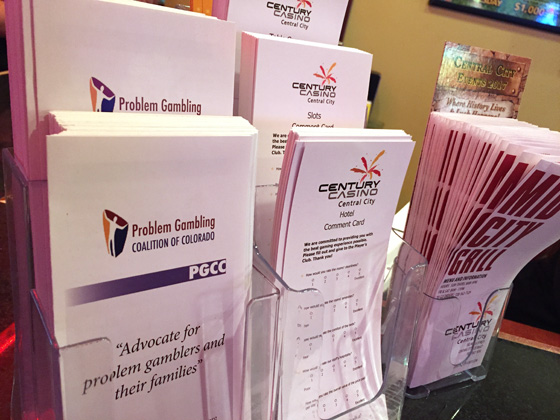
In Colorado the voters in 1991 elected to allow traditional casino gambling in only the historic mountain towns of Central City, Black Hawk, and Cripple Creek. Lotto and lottery gambling is, of course, a direct, voter-approved product of the State of Colorado, and is available at nearly every street corner (and truthfully offers much worse odds). The legal age to gamble in Colorado is 21 years of age. Any patron in a Colorado casino should expect to be asked to present photo identification as proof of legal gaming age. All (US) casinos and gaming establishments are strictly monitored by state regulatory agencies, in Colorado we are overseen by the Colorado Department of Gaming, a division of the Department of Revenue. There are significant penalties and procedures that have been in place—since Colorado’s first approval of limited gambling—to help prevent underaged gambling.
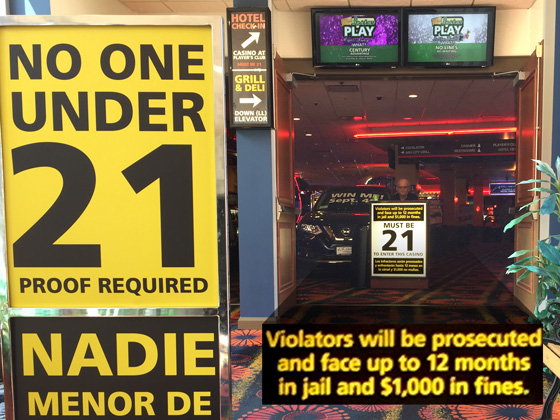
Casinos take this responsibility very seriously, and regularly discuss how to improve and better their process for detecting and removing underaged patrons in casinos, whether they knew they were breaking the law or not! It’s casino operators’ duty to catch them and prevent them from gambling, just as it is our Colorado operators’ duty to prevent visibly intoxicated patrons from gambling. Many will ask their younger-looking guests to wear a wristband once we have verified their identification, but nonetheless if you are young-looking, be ready to present your ID to prove your age!
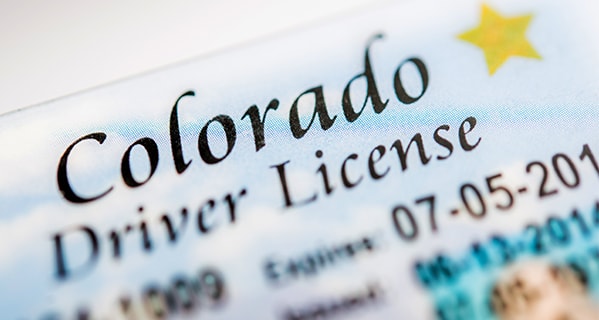
However, to read various articles about young people and the casino industry, you would think they would rarely have this problem at all! An oft-cited study by Stockton University outside of Atlantic City seems to indicate that “Millennials,” the name given to the generation reaching young adulthood in the early 21st century, have very little interest in gambling as a recreational activity. As the largest generational group in population at 83 million people, Millennials are every industry’s future customers. This is why the slot industry is looking at the skill-based video games they play, and trying to find ways to replicate those experiences within slot machines.
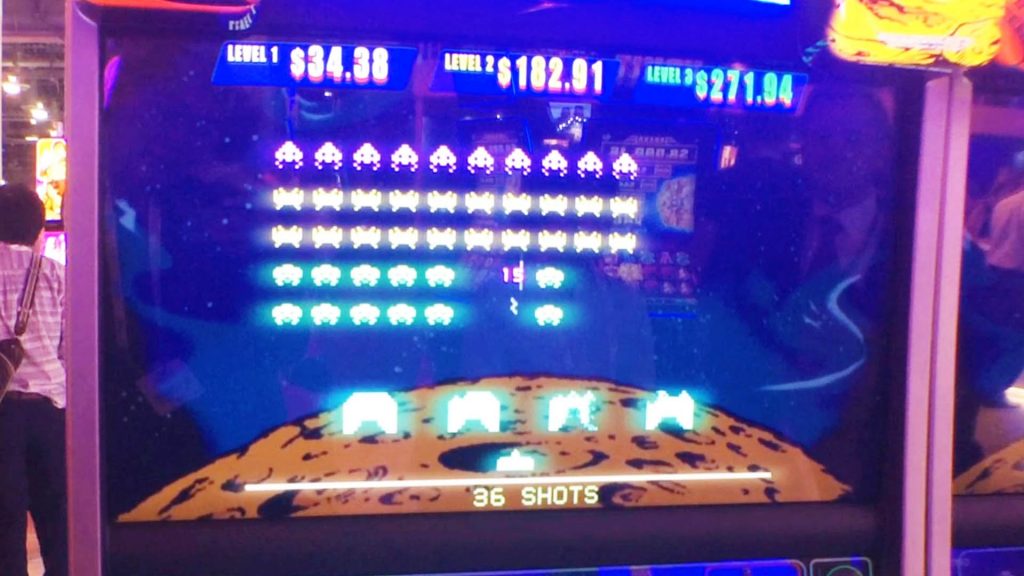
Until young people are old enough to gamble, if they enter a Colorado casino property they become that casino’s responsibility to notice, find, and report to the Colorado Department of Gaming. It’s something they are called upon to do with startling regularity. All casino entrances are posted with clear indications of the age requirements. Therefore a person breaking those rules is violating the law themselves, and is subject to as much punishment as the law deems appropriate. Should the law decide to pursue the case, underaged gambling in Colorado is a Class 2 misdemeanor punishable by anywhere from 3 months to up to 1 year in jail and or a fine of $250-$1,000. In addition, individual employees carry licenses that are individually issued to them, and this subjects them to individual fines and/or removal of their license if they fail to act in preventing underaged gambling. This can mean a person could lose the ability to work in their industry for failing to identify an underaged gambler, so PLEASE understand the importance of this rule, and NEVER break it, or help someone else do so!
Even as employees may be penalized by a regulatory agency, the steepest penalties for underaged gaming are those levied upon the casinos themselves. The Baltimore Sun reported in 2015 that four area casinos would be levied fines for admitting underaged patrons. Colorado investigates and levies fines as well, although they are perhaps not as publicly vocal as Pennsylvania’s Gaming Commission, which issues press releases almost yearly regarding its underage violation fines for casinos, for example totaling $50,000 in 2012 for two casinos and $80,000 in 2016 across four casinos. Most dramatically in 2012, Caesar’s Entertainment in Las Vegas was levied a stiff $100,000 fine for a series of violations, paired with a dramatic declaration by the Gaming Commissioner Randolph Townsend:
“If it happens again, I want a seven-figure settlement or else we will litigate it,” Townsend said. “As we enter the Internet gaming world, this becomes a significant issue.”
This is a forward-thinking concern, as some states in the U.S. like Nevada and New Jersey are have rolled out limited legal models of online gambling… for most of the country including Colorado, internet-based gambling is illegal, for precisely these kinds of concerns. Internet-connected mobile gaming—skill-based games with no stakes to be won—have already proven to present a problem in this regard when it comes to underaged players. Google, Apple, and Amazon have all paid massive class-action settlements and judgements for cases wherein parents sued as their children spent thousands of dollars through an online gaming portal, tied to an account associated with the parents’ credit card, with no clear set of controls. This behavior was seen in games with no gambling involved at all, based solely on the satisfaction and sense of reward the game can deal out with its audio and video presentation, and sense of unlocking and progression.

Even within other skill-based video games, young people have been able to find ways to build up whole gambling enterprises around them, using virtual items that represent in-game value or scarcity as their currency. Last year the community of the popular online shooting game Counter-Strike: GO was hit with a controversy involving gambling. Counter-Strike: GO is one of the most popular online games, and like many of them it offers the opportunity for players within the game to purchase cosmetic items to allow them to dress up and adorn their character and his equipment, like their gun. These cosmetic make-overs for items are referred to as “skins,” in that a new colored covering is applied to change the appearance the in-game equipment. These skins can be very common, or some of them can be very rare and hard to come by, increasing their “value” in the in-game economy. What’s more, some of these games are tied into to social gamer services or game economies, where players can trade skins for other items or “game money,” which some enterprising young people have found an (illegal) way to sell and convert into real-world currency.
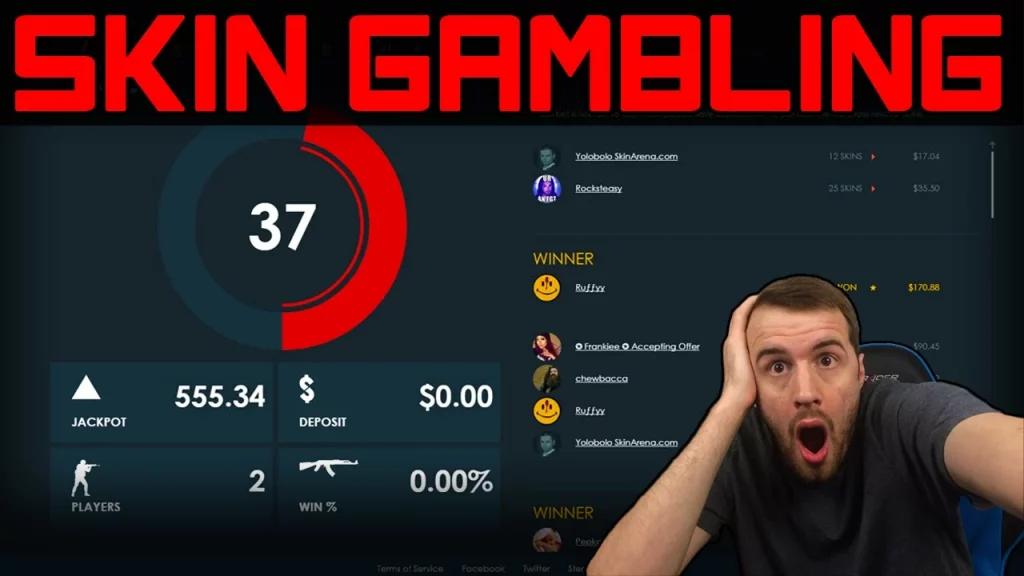
Many players of Counter-Strike: Go and similar games broadcast footage of their gaming exploits through video services like YouTube and Twitch.tv for their young fans to watch. Last year it was discovered and reported on gameindustry.biz that two such “Youtube stars” were running an elaborate scam promoting gambling in Counter-Strike: GO. They had been directing fans to the web site CSGOLotto.com—where they could offer up their “skins” as collateral for bets in a gambling portal on various gambling games or on the outcomes of matches—without disclosing they were in fact part-owners of the site. This drew both public and legal attention to the matter, which was much larger than most people knew. Quietly and out of the sight of most local regulators, online game “skins gambling” had become an industry estimated worth anywhere between $2 and $7 billion annually, as investigated by a Bloomberg article from April 2016: Virtual Weapons are Turning Teen Gamers into Serious Gamblers. The article indicates how the problem extends to other games as well, like Valve’s popular DOTA2 game. ESPN did an extensive write-up of the Counter-Strike skins gambling phenomenon earlier this year as well.
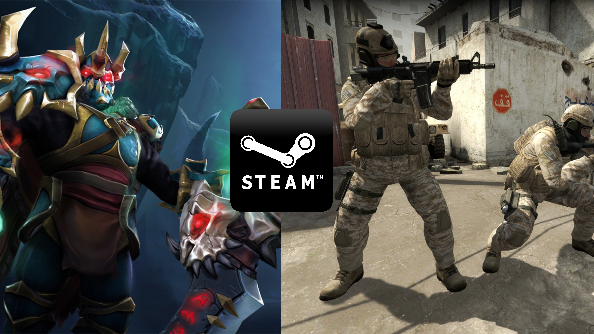
As the media surrounding the controversy (in tech and gaming circles) reached a frenzy, Polygon did a write-up of the response from the associated legitimate businesses: Valve, the company that owns the PC game service called Steam (upon which the Counter-Strike: GO game and economy is based), as well as the Twitch video streaming service owned by Amazon.com, issued condemning statements and cease-and-desist letters to crack down on third-party web sites like CSGOLotto.com. These various and often overseas sites had long taken advantage of various programming hooks built into these games’ “skin economies” to allow the unlocking of skins for various promotional activities like watching CS:GO matches on Twitch, for example. Like the regulatory crackdown experienced by fantasy sports betting sites like DraftKings.com and Fanduel.com the year before, the gambling operations had existed for some time previously, skirting the letter of the law and flying below the radar, until their advertising, growth, and sheer size demanded attention.
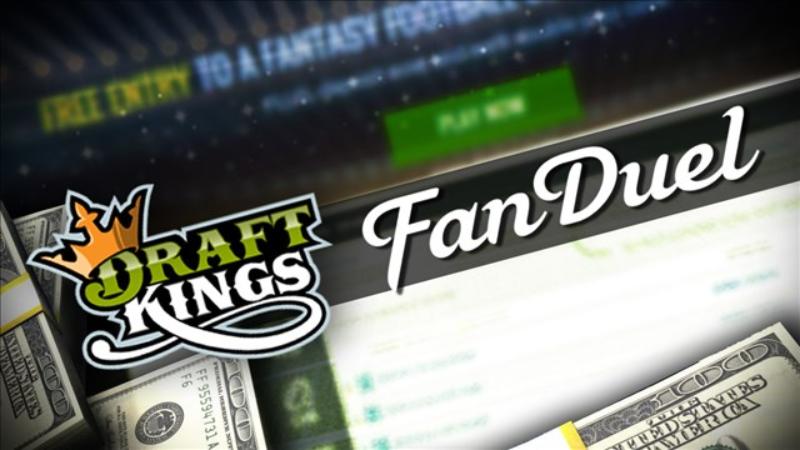
Amusingly, one of the biggest skins gambling companies that ran sites like CSGOlounge.com and DOTA2lounge.com improbably announced that they would be pursuing true gambling licenses in various areas to allow their gamblers to truly cash out. No doubt they discovered that running an illegal gambling business before you try to get licensed is one of the best ways to ensure that no state licensing and governing agency will permit you to run a legitimate one. The original announcement page linked to in the article now simply indicates they are out of the skins business altogether.
Nonetheless, Valve’s long-term complicity with the activity as detailed in the Bloomberg write-up has led to various lawsuits being leveraged against Valve as well as the associated third-party sites, as covered by Bloomberg in a follow-up. Media attention continued to be negative against Valve, and an article by Arstechnica called “Valve can’t pass buck to third parties for teaching CS:GO kids to gamble” puts a fine point on its role in forming the way these games internally distribute their skins and valuable items, through a randomized system of blind “loot boxes” that hide rare rewards until you open them. This recent innovation in video games, most common in online games featuring collectible cosmetic items of rarity, replaces the traditional unlocking or progression of award of video game items with an in-game slot machine to reveal your randomized progression rewards. You can’t get a skin in some video games without playing a game of chance for it.
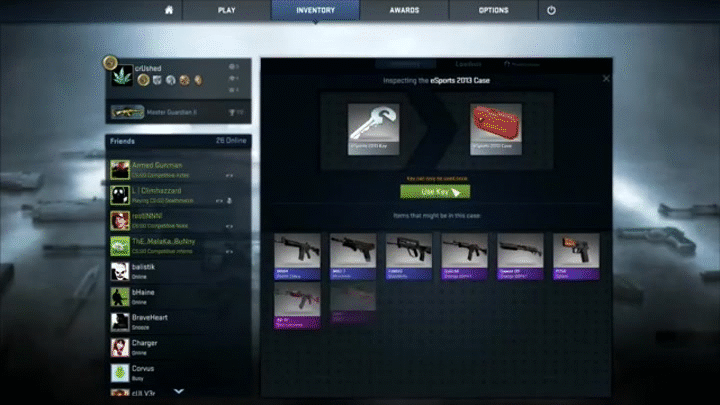
Eventually in October the Washington State Gambling Commission would step in and flex regulatory authority in the case, issuing a case-and-desist letter to Valve to compel them to close the programming “hooks” these third-party sites were using to transfer in-game items. The saga of “skins gambling” is by no means complete, however, as although the programming pipelines on Valve’s Steam service that made the process easy (and scalable) have been addressed via cease-and-desist letters, most of the service’s programming hooks remain unchanged. And Valve’s Steam is just one of many video game service economies: any game with in-game items of rarity that can be traded between players in an in-game economy is subject to this sort of abuse, introducing gambling to kids in secret online worlds. Also in October of last year, as reported by Polygon, the developer of one of the most popular and involving online massive multiplayer space-faring games, Eve Online, issued its own in-game crackdown on gambling, altering its Terms of Service and cracking down on third-party gambling web sites that were accused of trading real-world money for in-game items. This year in the UK, BBC reported another prominent gamer broadcasting videos on YouTube was busted for gambling violations involving the popular soccer simulation called FIFA. Regulating and controlling online gambling an ongoing process, on a new frontier of virtual regulation and control that never existed before.
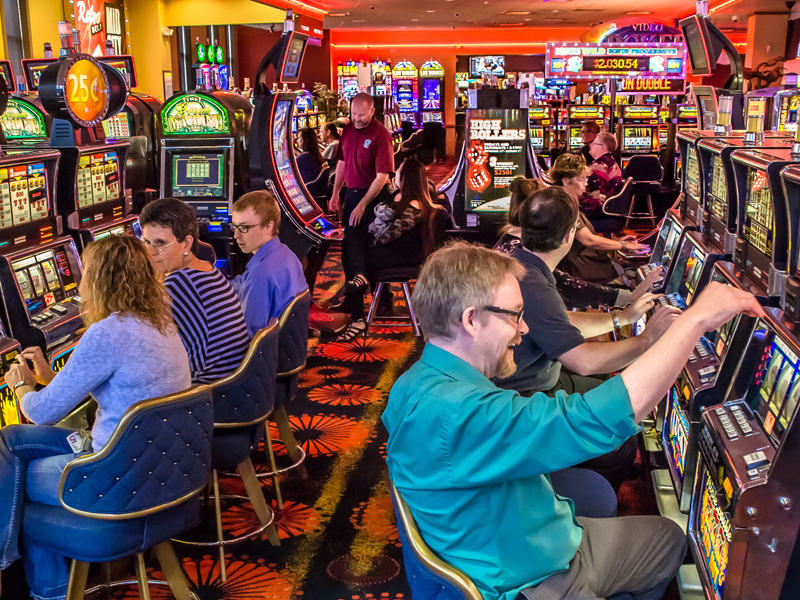
The goal remains the same: to keep the adult activity of gambling overseen, regulated by an agency representing the people, and out of the hands of children—just as we do alcohol or any of the other adult activities we have determined are too powerful or potentially addicting for young minds to handle. Young people are unavoidably fascinated with adult activities, and adult topics. Although many gambling industry people seem to think that young people have no interest in gambling, the activities these kids are exploring in their online video game worlds indicates otherwise. This is why gambling is best when confined to a controlled and regulated business like you’ll find here at the casinos in Central City, Colorado. As required by their state regulatory agency, their extensive camera coverage and patrolling allows them to find and prevent any underaged gambling on any casino property in ways that are as close to perfect as they can achieve, and are much better than the sort of results that are seen when gambling creeps into unseen and unregulated grey areas.
At some casinos in Central City, the lower floor holds event spaces, arcades, and restaurants where kids are welcome, allowing tourists and other guests to enjoy a some fun and a meal together in the heart of Central City! All hotel and casino areas are for patrons age 21+ only, so until you are old enough to be allowed to gamble in the State of Colorado, the upper levels are simply for adults only!
Running a casino and ensuring that gambling is a safe and fun activity available and limited adults is a terrific responsibility, and a great joy! Help them do their part to keep the activity adults-only, and make sure that when you are looking for gambling, you are looking for it in casinos in Central City!
Advertisement
